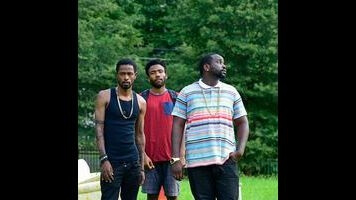At the very end of his recent New York Magazine profile, Donald Glover says that he doesn’t want his new FX comedy series Atlanta to provoke “clapter,” the Seth Meyers-coined term for “politically correct humor that elicits applause but that isn’t actually funny.” It’s a telling moment of self-awareness from the series’ creator, co-writer, and star, considering that Atlanta potentially opens itself up to being a clapter-filled woke-fest, something designed to be appreciated for its politics but isn’t enjoyable to sit through. Though technically about two cousins navigating Atlanta’s rap scene, the show really focuses on the malleability of racial identity and the lived experience of black America. Such a weighty premise suggests a sober perspective both on and behind the screen, but Glover and his team don’t get lost in the drama of the series’ reality. Instead, they present it unflinchingly and let comedy define the tone. In the process, they bring a fresh perspective on topics enervating in the culture at large.
Atlanta’s loose skeleton befits its subtly wide-ranging ambition. Glover stars as Earnest “Earn” Marks, a Princeton dropout who now works at the airport trying to sign up strangers for a rewards program. He’s “technically homeless” but occasionally resides with friend and mother of his daughter Van (Zazie Beetz), a precarious situation since she’s now dating other people. Once Earn discovers that his rapper cousin Alfred (Brian Tyree Henry), a.k.a. Paper Boi, has released a new mixtape that has taken over the streets, he strives to earn the trust of Alfred and his enigmatic right-hand man Darius (Keith Stanfield) in order to become their manager. Things get complicated when Earn and Alfred are involved in an incident that raises their profile and makes the journey to better their and their families’ lives a little more dangerous.
While Atlanta’s rags-to-riches narrative is the series’ main focus, it’s far from its primary selling point. It mainly functions as the structural backbone that allows the show’s offbeat vibe to flourish. Atlanta’s all-black, mostly unseasoned writers’ room (a concept still virtually unheard of in today’s diversity-focused entertainment environment) is largely responsible for its unconventional feel; everything from its minimalist episode structure to setup-punchline jokes scans as just a little “off” relative to the rest of television. Glover and company have obviously written Atlanta from a personal point of view, imbuing the show’s world with lived-in texture and specific referents, and that extends to the comedy itself, a distinct blend of absurd sensibilities eager to gain laughs from low-stakes dialogue exchanges and the deadpan surreality of the moment. The funniest scenes in the first four episodes concern the mundanity of abstractly troubling, often risky situations: the embarrassment of ordering a kid’s meal at a fast-food restaurant because it’s the only affordable option, a discussion of whether the term “daddy” is inherently sexual when it refers to a gun, the discomfort of receiving perks from a local chicken joint because they admire your reputation for violence.
The series’ low-burn comedic performances also stand out as genuinely unique, even in the currently overstuffed comedic landscape. Glover shines in the sincere straight-man role, a far cry from the giddy enthusiasm of his character on Community, and he successfully communicates Earn’s heartfelt desire to achieve something greater than his situation without devolving into overwrought, corny territory. Yet Glover doesn’t hold a candle to his two co-stars: Henry and Stanfield’s singular performances stand as arguably the best part of Atlanta, with their undeniable energy avoiding convenient, easy-to-explain definitions. Their mumbling, half-stoned comedic delivery, organic chemistry, and pitch-perfect timing demand attention. Henry brings a slightly bemused, constantly frustrated verve to Alfred, conveying a young rapper’s confusion-cum-fascination with newfound hometown success, especially as he wades through murky waters regarding his perceived status in his community. Stanfield’s Darius, in the running for best new sitcom character of the past few years, injects the series with an infectious spirit as he expresses deep curiosity and philosophical notions. “Life itself is but a series of close calls. I mean, how would you know you were alive unless you knew you could die?” he tosses off as he’s casually stacking salt and pepper shakers.
Thankfully, Atlanta forgoes tight serialization in favor of a shaggier, more ambling exploration of life on society’s margins. The episodes are mostly split into parallel narratives—one usually involving Earn and the other with Alfred and Darius—but the series’ disinterest in plot gives Glover and his younger brother Stephen—Atlanta’s story editor and writer of the second and third episodes (the best of the first four)—the opportunity to consider pet issues without the burden of structuring it around rise-and-fall action. In the first batch of episodes, Atlanta examines the struggles of the working poor, the disconnect between internet fame and local notoriety, and the exploitation and appropriation of culture for profit, all filtered through a black perspective and devoid of any self-congratulation or belabored drama. The series’ second episode features a harsh scene of police brutality against a mentally disabled man, but Glover never lingers on it for longer than a few seconds because it doesn’t exist to illustrate a point for white audiences. It’s just an unfortunately normal part of these characters’ lives.
Again, it’s important to note that the series’ drama exists in every scene but never dominates the proceedings. “The No. 1 thing we kept coming back to is that it needs to be funny first and foremost. I never wanted this shit to be important,” says Glover in the same New York profile, and Atlanta excels on that front, with rubber-stamped approval from the legendary Paul Simms (NewsRadio, The Larry Sanders Show).
Though not everything works—the pilot has a couple clumsy “explaining the themes” scenes and the fourth episode has a B-story involving an enthusiastic, naïve blogger that’s frequently tiresome—the series on the whole acts as a great argument for why investing in young, mostly untested talent can be a boon for creativity. Atlanta looks or sounds like little else on television entirely by default (not many shows feature white characters only in minor, peripheral roles), yet its mood and tenor can only be attributed to this creative team. The series exudes warmth and grace even in its smallest moments without losing sight of its sense of humor. “Try not to die,” Earn tells Alfred the morning before a drug deal. “Every day,” he responds with relaxed earnestness mid-blunt hit, only for Darius to politely inform the two that there’s probably a bullet somewhere in their cereal box. That’s Atlanta in a nutshell.
Reviews by Joshua Alston will run weekly.









































